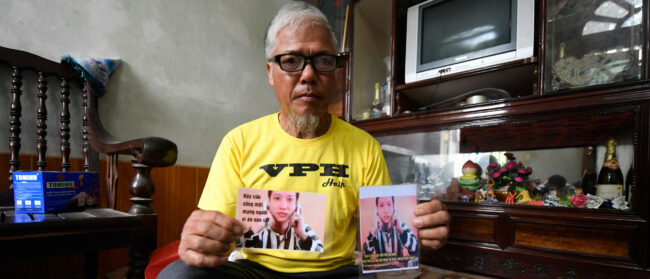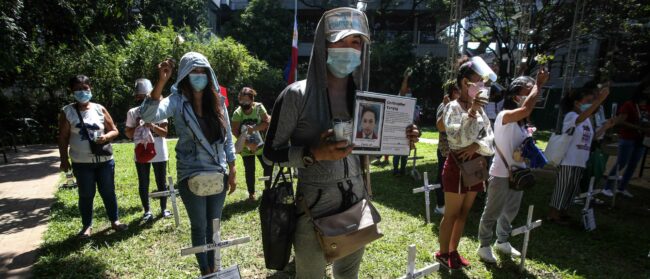On 16 November, the Khmer Rouge tribunal, officially known as the Extraordinary Chambers in the Courts of Cambodia (ECCC), pronounced senior regime leaders Khieu Samphan and Nuon Chea guilty of genocide. In the wake of this landmark ruling – the tribunal’s first genocide conviction of former Khmer Rouge officers 40 years after the fall of the regime – commentators and diplomats are growing increasingly confident that the ECCC’s operations will soon terminate, despite the fact that additional cases remain on its docket.
This pessimism is largely a reaction to years of Cambodian political opposition to the ECCC’s pursuit of cases beyond those completed in mid-November. Prime Minister Hun Sen – himself a former Khmer Rouge commander who defected from the group in 1977 to join the Vietnamese-led push to overthrow Pol Pot’s regime – objects to the ECCC’s prosecuting of these additional cases, which are aimed at lower-level Khmer Rouge cadres. Hun Sen has claimed that doing so would ignite “a civil war” that would kill “200,000 to 300,000 people.” Minister of the Interior Sar Kheng, in a November speech to a crowd that included some former Khmer Rouge soldiers, proclaimed, “There will be no more investigations taking place, so you don’t have to worry” and that “the process has ended”.
Asked how the ECCC will proceed amidst this government pressure, tribunal spokesman Neth Pheaktra responded opaquely: “No comment”.
On 28 November, the ECCC’s co-investigating judges announced that they were split on one of these remaining cases, that against Meas Muth, who is alleged to have been the Khmer Rouge’s naval commander. His case will now proceed to the Pre-Trial Chamber, where it is likely to reach a deadlock unanticipated by the ECCC’s founders. The tribunal, despite this likely coming stalemate, plans to operate through 2020, further adding to its current estimated $300 million in costs. Some Cambodians and international commentators are questioning if this pursuit of belated and perhaps unobtainable justice is worth the price.
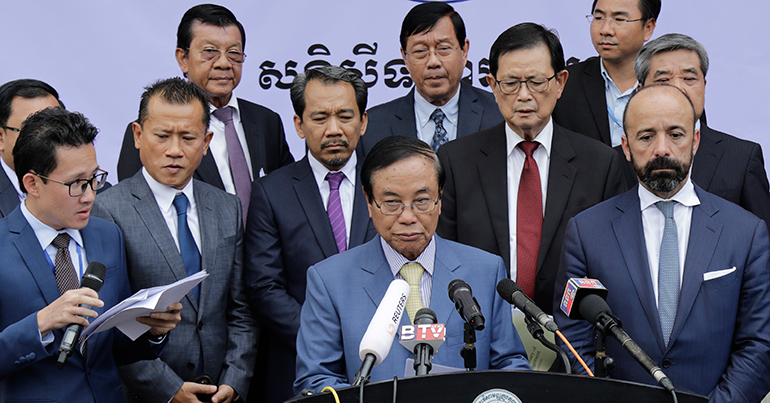
An unforeseen impasse
The ECCC’s Pre-Trial Chamber requires a supermajority – agreement from at least four of its five judges – to overturn a co-investigating judge’s order. The Cambodian co-investigating judge refused to indict Muth on 28 November; his international counterpart indicted the regime’s former naval commander. The Pre-Trial Chamber Cambodian judges cannot overturn Muth’s indictment without international support due to the chamber’s supermajority requirement.
Both the Cambodian and international Pre-Trial Chamber judges are likely to support the rulings rendered by their co-investigating counterparts, according to Craig Etcheson, who previously worked as both an ECCC investigator and director of the Documentation Center of Cambodia. This predicted support would leave both sides without the necessary supermajority to proceed, effectively deadlocking the chamber and closing off any clear path forward.
Etcheson said there would be a problem if neither side secures a supermajority: “We would be left with two standing contradictory judicial orders. The ECCC Internal Rules do not contemplate such a stalemate, or offer any guidance on how it might be resolved”.
Tribunal spokesman Neth Pheaktra offered little clarification on this front.
“In case the required vote cannot be reached, the judges of the Pre-Trial Chamber will decide how to proceed further,” he said. It is unclear what this decision will look like.
The tribunal instead appears to be careening towards “an impasse which was anticipated neither by the drafters of the UN-Cambodia agreement nor by the designers of the ECCC Internal Rules”, as Etcheson put it.
“While there are provisions to safeguard the integrity of the proceedings… these are clearly insufficient.”
Priya Pillai, lawyer
Priya Pillai, an international lawyer who worked on the United Nations International Criminal Tribunal for the former Yugoslavia and now consults in Southeast Asia, described the ECCC’s current struggles as largely a result of its institutional susceptibility to political pressure.
“The ability to in effect stymie the proceedings unfortunately emanates from the structure and functions of the court as a result of the agreement between the UN and the government of Cambodia, which includes provisions for a split between national and international prosecutors and judges,” said Pillai. “While there are provisions to safeguard the integrity of the proceedings… these are clearly insufficient.”
One senior tribunal official, speaking on condition of anonymity, echoed concern over this potential coming deadlock.
“There’s no clear answer on what happens if the Pre-Trial Chamber is split,” the official told Southeast Asia Globe. “It’s a big hangup.”
The cost of justice
Muth’s case is nearly identical to that of Ao An, the alleged deputy secretary of the Khmer Rouge’s Central Zone. “[It] is the same situation as with Ao An,” said Pheaktra, the tribunal’s spokesman. An’s case is currently also at the Pre-Trial Chamber, and the ECCC expects to announce its decision – likely to also be a stalemate – by the end of the second quarter of 2019. Yim Tith, another accused mid-level Khmer Rouge cadre, is awaiting closing orders from the co-investigating judges, which the ECCC also expects to come by the end of the second quarter of 2019. Beyond these cases, the tribunal expects appeals by Khieu Samphan and Nuon Chea of their most recent genocide convictions to continue through the end of the third quarter of 2020. The ECCC, therefore, plans to remain in operation for at least the next 22 months.
The tribunal has already cost over $300 million, most of which has been provided by Japan, the US and Australia. China, Hun Sen’s new main ally, has given nothing. Cambodia contributes considerably to the ECCC and provided $12.92 million of its $58.80 million 2016-17 budget, which included $6.73 million for employee salaries and $1.61 million for non-staff compensation. Cambodia is set to provide $11.16 million of the tribunal’s $46.12 million estimated 2018-19 budget.
Given the Pre-Trial Chamber’s likelihood to be deadlocked in An and Muth’s cases – and without a clear mechanism through which to proceed – some would prefer Cambodia no longer contribute these funds and instead allow the tribunal to cease operations.
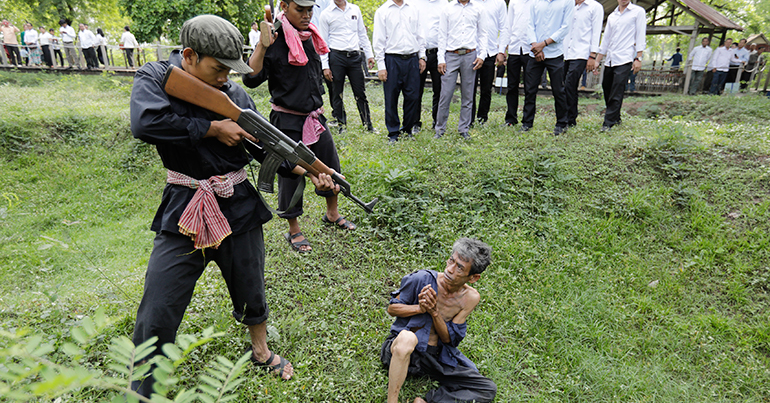
Ou Virak, founder of the Phnom Penh-based Future Forum think tank, recently suggested to Nikkei Asian Review that Cambodians are ready to move on, particularly given the continuing costs.
“Maybe people are fed up that Cambodia has been referred to as ‘the killing fields’ for the last 40 years,” he said. “Maybe Hun Sen is understanding his public a bit better, and I think he might get Cambodian support by saying: ‘Let’s close this chapter and move on.’”
But others believe the pursuit of justice is necessary – no matter how belated or at what cost.
“Of course I really want the court to continue their work against lower Khmer Rouge officials,” Arun Sothea, 46, a survivor of the regime’s violence that left him an orphan, told Southeast Asia Globe.
The Khmer Rouge separated Sothea as a six-year-old from his family and forced him to live in a child labour camp. When he was sick and couldn’t work, labor camp officers refused to feed him. Sothea once gave in to his hunger and snatched a fish to eat from a pond; the Khmer Rouge punished this act with imprisonment and torture. “I was lucky to survive,” he said.
“I ran to find my family immediately but the neighbors told me that all, about 36… of my family members were killed”
Arun Sothea, Khmer Rouge survivor
In late 1978, Vietnamese soldiers drove the Khmer Rouge out of Sothea’s village and, still a child, he began searching for his family.
“I ran to find my family immediately but the neighbors told me that all, about 36… of my family members were killed,” he recalled. “I [have] had to live alone as an orphan since.”
Sothea believes that the ECCC will help both him and Cambodia close this chapter in their shared painful history and educate young people.
“We want to see all [the] killers be [held] responsible for killing millions [of] people brutally. And we also want to see this court be [a] role model for others, especially this and [the] next generation”
He added: “The justice for millions [of] victim[s] should not be compared to any amount of court expenses.”
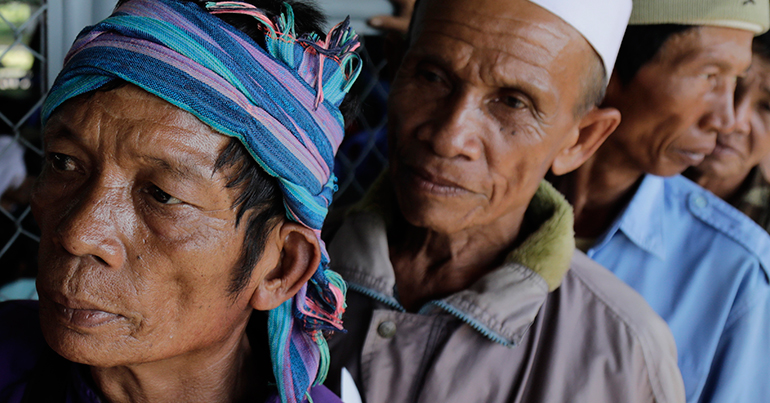
“It would not be an ideal solution”
There is a chance the ECCC will turn over its remaining cases to Cambodian courts, which would enable the tribunal to avoid the potential embarrassment of indefinite Pre-Trial Chamber judicial limbo. A senior tribunal official speculated that some within the ECCC may be considering such an option.
“Such a resolution was discussed among donors and the UN nearly ten years ago,” Etcheson said. “They envisioned that these final cases could be turned over to Cambodia’s national judiciary for final resolution, while the UN declares victory and heads home.”
“For any future tribunal contemplated, such as for Myanmar, the lessons would be clearly to learn from the ECCC – and to avoid duplication of the same model”
Priya Pillai, lawyer
Cambodia’s judiciary is deeply politicised, meaning that the cases against Muth, An and potentially Tith would likely be swiftly terminated, with the courts acquiescing to Hun Sen’s pressure. The Kingdom came in 112th out of 113 countries, and last in Southeast Asia, in the World Justice Project’s 2017-18 Rule of Law Index. The index deemed Cambodia’s civil justice system to be greatly susceptible to improper government influence and corruption.
“The national courts would undoubtedly make short work of the cases,” said Etcheson. “It would not be an ideal solution, but at least it could be framed as a judicial solution.”
While this judicial solution would likely be deemed a failure by Western and democratic observers and benefactors, including the US and Japan, there is concern that deadlock at the Pre-Trial Chamber would do irreparable damage to the ECCC’s reputation, and maybe hinder future similar tribunals in countries like Myanmar.
On the other hand, Pillai, the Southeast Asia-based international lawyer, said the ECCC’s plentiful shortcomings are already well-documented.
“For any future tribunal contemplated, such as for Myanmar, the lessons would be clearly to learn from the ECCC – and to avoid duplication of the same model,” she said. “There are other models to choose from – the International Criminal Tribunal for the former Yugoslavia, the International Criminal Tribunal for Rwanda, the Special Court for Sierra Leone, among others – all with their own problems and also not perfect, but not to the extent of the ECCC.”
Still, Etcheson and others worry that a Pre-Trial Chamber stalemate would permanently tarnish the tribunal’s reputation.
“If these cases… are not resolved judicially, and instead are left hanging in limbo in some sort of legal purgatory, it will represent a complete collapse of the court’s machinery and constitute an historic blemish on the legacy of the ECCC,” said Etcheson.
A senior tribunal official who wished to remain anonymous expressed similar thoughts: “If the will cannot be mustered to see these cases to the trial chamber, it will be an astonishing failure. If something isn’t done, it will reverberate. Why’d we even go this far?”

